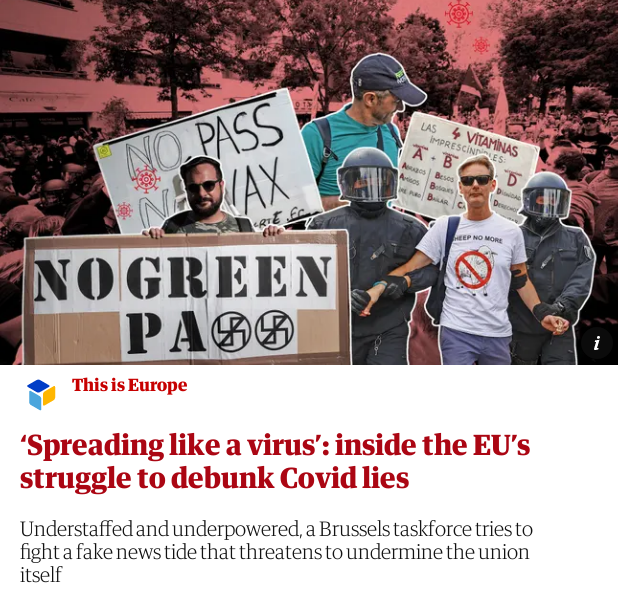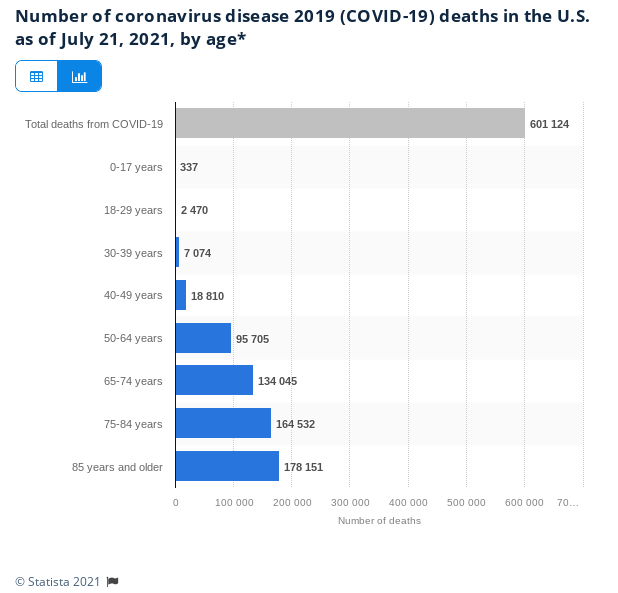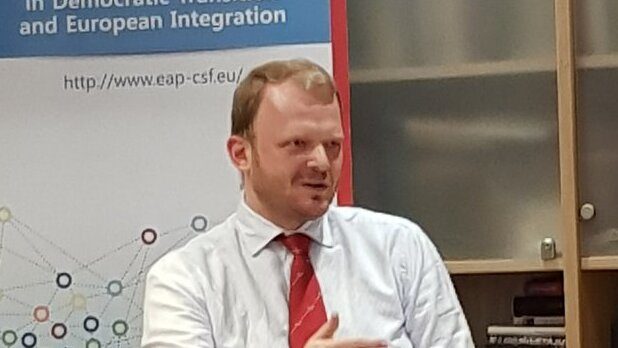The Guardian this week published a piece looking into the EU’s efforts against people being able to have opinions that differ from the government’s official narrative, with the goal of getting people to agree that what’s needed in order to save lives is more censorship.
In April 2020, near the start of the global pandemic, Felix Kartte was working 14-hour shifts as an EU policy officer, struggling to monitor a barrage of coronavirus-linked disinformation.
Articles claiming that the pandemic was a hoax, that it was caused by 5G, that it could be cured by hydroxychloroquine or alternative medicine were going viral across the continent – part of a global phenomenon the World Health Organization warned was becoming an “infodemic.” Kartte and colleagues in StratCom, the EU diplomatic service’s strategic communications division, could detect what they say were patterns of Covid-denier and anti-vaxxer disinformation linked to Russia and to a lesser extent China, being disseminated in several languages across Europe.
They scrambled to flag the bogus reports on their monitoring database and wrote up internal reports. But problems arose when they produced a public assessment which said China was pushing false narratives to deflect any blame for the pandemic. Believing the report to be finalised, Kartte was surprised when the office of Josep Borrell, the EU’s foreign policy chief, paused its release for rewrites. In the document that was eventually published the criticisms of China appeared to have been softened.
Kartte said he was “outraged”. “Our job was to inform EU citizens about attempts by authoritarian states to deceive and manipulate them,” he said. “I had always been convinced that our analyses should be as objective and transparent as possible.”
Oh, no! Evil China released a virus that only kills the elderly who are already on their deathbeds!
When these people talk about “coronavirus misinformation,” they’re talking about people who don’t parrot the exact official narrative.
Since the start of the pandemic hoax, they’ve been trying to set up a situation where disagreeing with the government is seen as the same as inflicting harm upon people, being some kind of mind-controlled foreign agent, or a metaphysically evil bioterrorist.
When the original was leaked, the department was accused of bowing to pressure from Beijing. Borrell, under questioning from MEPs, denied it and instead pointed the finger for unhelpful leaking at “a member of the staff”. While he used no names, many understood him to be referring to Monika Richter, a Czech analyst and one of the report’s co-authors.
The episode revealed deep tensions around attempts to stem a tide of fake information and conspiracy theories. More than a year on, the EU remains under fire for its failure to implement a credible response to disinformation, which has proved a huge threat to the global management of the pandemic, including by fuelling vaccine scepticism. The EU’s financial watchdog, the Court of Auditors, warned in June that Europe’s fragmented strategy on disinformation was being “outpaced” by emerging threats.
If the pandemic were real, these people wouldn’t need to fight what they call disinformation because people would see the pandemic with their own eyes.
Kartte and Richter have both left the EU’s diplomatic service, but spoke to the Guardian, along with several serving and former EU officials. The picture that emerges is of a counter-propaganda effort hamstrung during the pandemic by a mandate focused almost entirely on Russia. It is a picture of a hardworking but understaffed disinformation unit embedded in bureaucratic structures too politically risk-averse to heed its findings and ill-equipped to combat a threat as vast as the one the bloc faced with Covid-19. This weakness, say experts, has enabled the spread of harmful anti-vax sentiment across Europe and the rise of domestic Covid-sceptic movements.
“The EU’s response … leaves an open field to anti-vax disinformation, fuels Covid-denier movements and sows distrust in public health authorities,” said Nathalie Vogel, a senior analyst at Kremlin Watch, which monitors Russian disinformation for the European Values Center for Security Policy. “All this is partly self-inflicted.”
…
From an open-plan office at the HQ of the EU’s diplomatic service in Brussels, a team of analysts scours the internet for published stories aimed at influencing European public opinion. They fact-check any that raise suspicions. Material identified as false or misleading is recorded on a publicly available database. This operation dates back to 2015 when after the occupation of Crimea by pro-Russian forces, the EU set up a unit within StratCom dedicated to countering Russian propaganda. Its flagship tool is called EU vs Disinfo, a project aimed at documenting and publicly debunking conspiracy theories and misleading content from sources linked to Russia. Its analysts write for a website and send out a weekly newsletter in English and Russian.
Jakub Kalensky, who was the EU’s top disinformation analyst between 2015 and 2018, helped design the tool. Kalensky recalls working largely alone at first, putting in long hours and weekend shifts assisted only by a network of unpaid volunteers around Europe. “They were all working for us for free since we had no money,” he said. The team were encountering dozens of disinformation stories a day. Only when fears about Russian hackers attempting to influence elections grew did the team receive its first dedicated EU funding. After the 2018 poisoning of Sergei and Yulia Skripal in Salisbury it was expanded. In the same year, the EU created a Rapid Alert System, a tool that EU member states could use to share insights on disinformation.
The taskforce now employs 16 people and has an annual budget of several million euros. Six people work solely on the EU vs Disinfo project, all of them relatively young, with backgrounds in journalism, communication or diplomacy. But the size and reach of the operation are dwarfed by the budgets believed to be available to those using disinformation to undermine the EU. Russian state-backed media reportedly have a combined annual budget of about $2.8bn. A campaign aimed at promoting the Sputnik V vaccine and undermining public trust in the European Medicines Agency for example, accelerated in the spring of 2021 with the combined involvement of Russian state authorities, state companies and state mass media, the EU said in April. The EU taskforce’s meagre resources however, mean that it can only hope to capture “the tip of the iceberg,” Kalensky said.
It’s truly amazing that they keep bringing back Russia, after having been humiliated with fake Russian hoaxes on so, so many occasions.
It just shows they have no sense of shame.
We know they’re lying, they know we know they’re lying, we know they know we know they’re lying – and they just don’t care.
#Disinformation Resilience Index launch event: Jakub Kalensky, from @EUvsDisinfo @eu_eeas, "The EU needs to learn from systematic responses to #disinformation by Eastern European countries […] This is a long-term threat, not only targeting our elections but our values." pic.twitter.com/2ErTnDmVQT
— EaP CSF (@eapcsf) July 16, 2018
You can see it in his face that Kalensky really cares about the well-being of people.
He’s been making a living from this “disagreeing with the government means being a foreign agent” bit for a while now.
Jakub Kalensky of #TYTEAct, member of East StratCom presenting their mission against Russian disinformation to #tacklefakenewsEU: Main objectives: Better communication on EU in Eastern countries, Supporting free media & Raising awareness of Kremlin disinformation campaigns pic.twitter.com/qHp1g5fzOp
— Lovisa Lilliehöök (@Lolovisa) January 30, 2018
Find out how #Kremlin employs democratic values for its disinformation and propaganda in our recent #UWpodcast with Jakub Kalenský, the senior fellow of @AtlanticCouncil : https://t.co/avDD8m6kjM pic.twitter.com/Y6ec7orh5N
— UkraineWorld (@ukraine_world) August 12, 2019
When did the government become supernaturally moral?
They tell us themselves that most of their history as the government was evil racism, but now they’re the deciders of moral righteousness and truth.
How did that transformation happen?
Has the Guardian written any essays about the processes involved in this transformation?
 Daily Stormer The Most Censored Publication in History
Daily Stormer The Most Censored Publication in History





